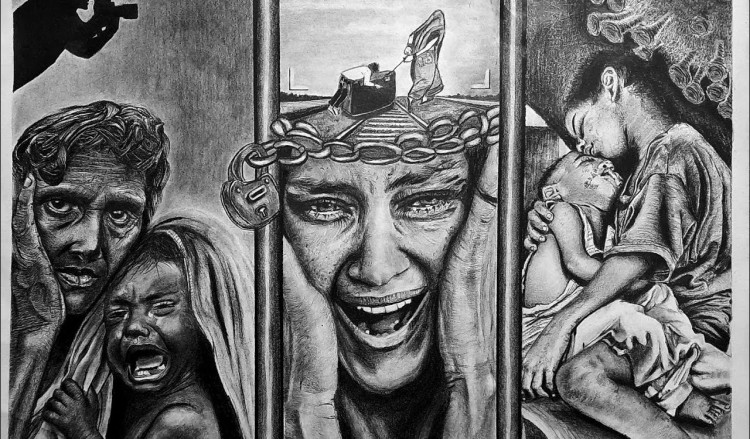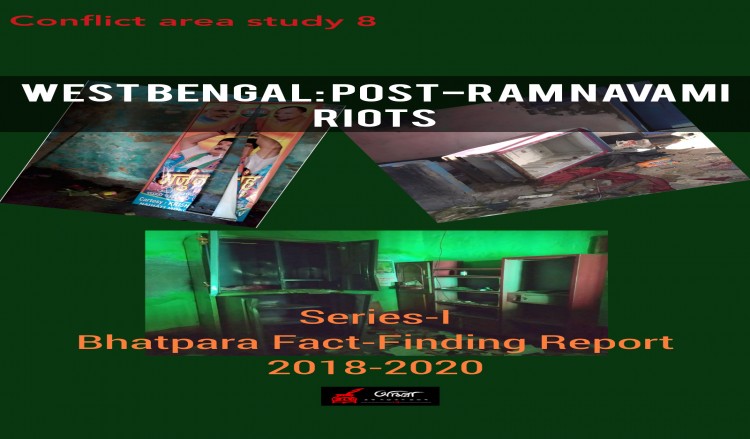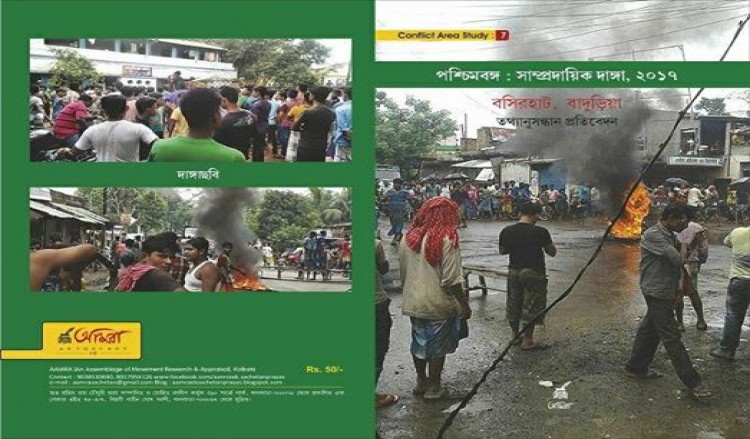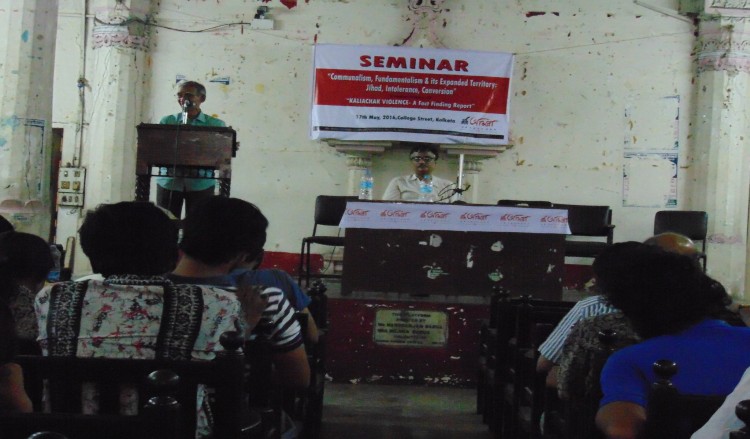
Seminar on Communalism, Fundamentalism and its expanded territory-Jihad, Conversion and Intolerance, Kolkata,16 May, 2016
On 16 May, 2016 we had organised a seminar on ‘Communalism, Fundamentalism and its expanded territory: Jihad, Conversion and Intolerance’, at Mohabodhi Society Hall, Kolkata. Speakers were Ram Puniyani and Debaprasad Bandopadhyay. We also published ‘Kaliachak Fact-finding Report’ on said day.
Seminar: Communalism, Fundamentalism and its expanded territory: Jihad, Conversion and Intolerance
Mahabodhi Society Hall, College Street Area, Kolkata
On 16 May, 2016 we had organized a seminar on ‘Communalism, Fundamentalism and its expanded territory: Jihad, Conversion and Intolerance’, at Mohabodhi Society Hall, Kolkata. Speakers were Ram Puniyani and Debaprasad Bandopadhyay. We also published ‘Kaliachak Fact-finding Report’ on said day.
Concept Note
Conflict and coexistence study is in fact a contested subject. In the journey of field study on ethnic and religious conflict AAMRA noticed the different notions and practices existing in the society which are exercised as remedy for the conflict. Our field research (fact-finding, socio-cultural survey, documentation of Akhra, Dargah, Nazargah, Ursh etc) explore some unique societal ingredients from folklife-music-religion and the time they practiced. Our documentation on Pathorchapri Fair at Birbhum, Bera Bhasan Festival at Murshidabad, Lalon Mela at Kusthia, Bangladesh had already been released/published. Concurrently our initiation on conflict study and initiative to interact with the victims at Kharmadanga, Samudragarh, Kaliachak, Muzaffarnagar, Kokrajhar have a presence in printed format. We are supposed to be jaded by this time, but the millennial practice to live with all fabrics and rhythm of Baul, Alqaf, Murshidi gives us liveliness to resist and to combat communalism, fundamentalism.
The topics represented here are not only an inclusive summary of the present time but also a vivid historiography of communal and religious fundamentalism of India. We think in this hall contemporary listeners will take part in the interactive session and make this discussion lively and effective.
SPEECH SYNOPSIS OF DR. RAM PUNIYANI-
Fundamentalism: Global and National Impact on Politics
Today World is witnessing the rampage of politics in the name of religion. We have terrorism in many parts of the World, mainly originating from West Asia due to politics to control oil, masquerading in the cover of religion on one hand. On the other hand, at the national level we have communal politics aspiring for Hindu Nationalism in India, Muslim Nationalism in Pakistan and Bangladesh.
This current era of politics is trying to push back the democratic values in India and struggle towards better values Worldwide. The major dominant fundamentalism in India is Hindutva, which is trying to undermine the politics around democratic values and the principles of Indian Constitution. The origin of Communal streams in India took place during the freedom movement, when with the rising Indian nationalism, the declining classes of landlords and their ideological associates threw up Nationalism in the name of religion. These nationalisms, Islamic and Hindu, were not part of the freedom movement, and did not believe in a modern nation state based on the values of Liberty, Equality and Fraternity.
They were rooted in the values and social relations of feudal times, the values of birth based hierarchy of caste and gender. The Hindu nationalist stream began as Hindu Mahasabha and later on RSS came to articulate Hindu nationalism. It began with an understanding that India is a Hindu nation. Hindu society was free from blemish in ancient times. With the coming of Muslims; the caste and gender issues began to come in. RSS indoctrinated their followers into trained Swayamsevaks, Pracharaks for the goal of Hindu nation. RSS itself does not participate in elections but has propped up myriad organizations to pursue the goal of Hindu nation. They oppose the Indian Constitution, time and over again. Have been aloof from the issues of people, issues of livelihood, issues of dignity of weaker sections of society, and harp mainly on identity issues, Cow as Mother, beef ban, Ram Temple, Bharat Mata ki Jai, Deshdrohi etc.
With Modi coming to power RSS is influencing the politics from bottom up and from top down. During the last two years RSS affiliates have spread Hatred, are trying to abolish the autonomy of educational institutions, the atmosphere of intolerance is growing and freedom of speech is under peril. There is a need to cultivate the values of freedom movement, the values of diversity, pluralism, amity and equality. In the face of the current threat of RSS politics, there is a need to build joint platforms for preservation and promotion of democratic values, dignity and diversity.
SPEECH SYNOPSIS OF DR. DEBAPRASAD BANDYOPADHYAY-
1. My watch is right, your watch is wrong: The problems of our own fundamentalism: “fundamental” and “original” knowledge and truth-claims. This attitude leads to violence: annihilation of others.
2. Foreclosure of market fundamentalism and foregrounding of religious fundamentalism.Sponsorship of “dangerous class” through the module of race, language and religion by the market fundamentalist masters of the universe. Deliberate implementation of Malthusian theory of positive (?) checks for the sake of primitive accumulation. Bankers’ role in manufacturing conflict.
3. Problems of state secularism (interpreted as sarva dharma sambhava instead of “not religious, not spiritual). The positives and negatives of sampradaya. The problems of state-sponsored sampradaya- the hybrid space (khaki shorts and saffron flags) and mimicry (Hindu as mirror image of organized religion)
4. Jihad as manufactured tool vis a vis jihad as counter-hegemony: Visions of Simone Machard.
5. Is there any outside(s)? My journey: negating religion and purana with the help of darsana. The theory of alternity or vaikalpikata. Praxis of asvikritigrahana (accepting a legitimate possibility) and svikritigrahana (committing oneself to supposed truth-room). Proposing anekantavada as a method without imperatives.
Speech of Ram Puniyani was transcripted by Agniswar Chakroborty and speech of Debaprasad Bandopadhyay was transcript by Maitri Das. Here are the edited version of their speeches.
Debaprasad Bandopadhyay
I am really thankful to the organizer, Aamra Ek Sachetan Prayas for keeping faith and believing in me. I am also grateful to the audience for coming on such a sunny afternoon. I eventually uttered the words "belief" and “faith". These two words are very problematic and addictive for an atheist person like me! I can’t believe in anything! I have directly declared that “I don’t believe anything”. But it is a complex issue! Meanings are complex in this case, problematic. The word “faith” is very problematic. I would like to trace the problem. We have fundamentalist selves within us. Struggle for atheism is also problematic in a sense. When I teach atheism in class, there emerge some problems. There comes the question of belief and faith. (The word faith is problematic. I would like to talk about the problem of the word faith today.) To explore the realm of logic from the faith and belief, I would like to quote the preceptor who was engaged in various debates among different religions.
So, I start with this quote. He said, “I think my watch is correct and yours is wrong. This "belief of correctness" is the primary aspect of fundamentalism which remains completely unaddressed. This happens in the process of foregrounding religious fundamentalism. We commonly ignore many other fundamentalisms. Take one example. “I think the heterosexual, reproductive, monogamous family is the best type of family in the world!” When I deliver this statement by demanding it as a “truth”, I am simultaneously excluding some other realms like the questions of lesbian, gay and third gender, trans gender. I simply excluded these. We always exclude such things and get trapped within the fundamentalist paradigm. Therefore, primarily, if we have to attack fundamentalism, religious fundamentalism we must look into ourselves and evaluate our various fundamentalist approaches. Aren’t we stopping the dialogues among individuals by deciding like -“you must stop at this point? My word is the ultimate and the only truth. The other truths are wrong.” At this point, hundreds of flowers stop blooming. Here, the space for dialogue crunches, democracy collapses. Because, one of the larger meanings of democracy is space for dialogue between you and me. I will not punch you and I expect the same respect.
But this type of fundamentalism is pulling us towards a harsh and fierce world. I would like to share a personal experience in this regard. Recently, I visited Hyderabad Central University, where I and Marugam were staying at the same guest house. We didn’t talk to each other. I tried but failed. You must have heard about Marugam, whose novel created a huge controversy in Tamilnadu. A movement was launched against this novel by the religious fundamentalists, especially by the Hindu fundamentalists and the casteist. Marugam said that he will stop writing. My students of the HCU and I, being the next door neighbor for the time being, could not initiate any dialogue! He fears us. He insisted the students not to inform the press. This situation arose only after he faced a terrific attack, even life threats. He is not allowed to speak. He is forced to be silent. That means, when we can’t tolerate any oppositional voices, when I am unable to fight by logic, I will resist you by mudding, by stopping your dialogues, by stopping your every activity. Dialogues are restricted. When a neighbor of mine raised her/his finger on me, saying “he is the shame of the Hindu religion, he does not follow any religious rituals. Whenever I face such an attack I realize that my footing in this context is shaping in different way, getting problematic. Why should I care so much about religious rituals? Simultaneously, I ask myself whether “my watch is running right or not!” This self-questioning is important to recheck the suitability of the counter attack that I do. How fierce am I to them? Marugam silenced himself. He is not showing any fierceness. Davolkar was murdered! The bloggers who are protesting by writing are killed, that means the space of silence has been seen by death. But I feel, are there any other fundamentalisms rather than religious fundamentalism? By foregrounding religious fundamentalism we are losing the vision of other fundamentalisms. Let me explain. When I introduce myself in any institution by demanding that I have some fundamental knowledge on something or when I chant the word funda in the local ADDA, we use the word in an affirmative sense. We say “that man has original knowledge.” Clearly, by these statements we deliver some demand for the truth. Who claims for the truth? There are two types of men – political leaders who fixed their bull’s eye on the supreme political powers and the religious GURUS. But for people like me, that very hypothetical truth that is emerging at 3.43 pm can just break down into pieces at 3.53 pm. Here we must remember the word “hypothetical”.
Therefore, there is no question of surfacing with the “roots”, “elementary” or “fundamentals”. What I shall speak, here is a conscious effort like Amra Ek Socheton Proyas which declares that I am not placing any demand of truth. I am not talking about any faith and belief.
There is a film called The Stalker by Andrey Tarkovsky, the Stalker, the narrator of the famous film, the Stalker was going to a “room of wisdom” with a scientist and a writer. That means, we assume a “room of wish” randomly, according to our wish. They were going to their “room of with”. At last, in the film, the narrator stops and says “the scientist and the writer are weird! They don't believe in anything!” I am in such a position where nothing can be believed. Our poet, Jibananada wrote, “We built many rooms of faith, then realized that the rooms do not exist.” These rooms are constructed by faith, they are fragile. This poem is called “bivinno chorus”. I would like to recognize the fragile room.
In the process, I observed that the foregrounding of religious fundamentalism foreclosed another fundamentalism. That is market fundamentalism. It provides free flow of private capital. This “free flow of private capital” is recognized as a “natural” phenomenon by the science community institutionally. The phrases like “rules and regulations/law of market”, “market runs itself with its own rules”, “market is natural” etc. An academic discipline called econophysics has emerged. This market fundamentalism is dangerous. The fierceness of market fundamentalism has been covered up by foregrounding religious fundamentalism. That means, religious fundamentalism has been prioritized over the struggle to stop the free flow of private capital. That’s why we are observing the murder of the bloggers by the fundamentalists in spite of looking at the market fundamentalism. I have a very simple question in this regard; the last two incidents occurred in Paris, the weapon reservoir, or the weapon bank of the worldwide fundamentalist’s forces, I would like to ask you – there is a very large amount of weapon holding of either of the two RSS or ISIS. Here, an underground institution called ANANDAMARGI of RSS has a very large amount of stocked weapons. You know the case of weapon rain in Purulia, remember the incident that happened in the 80s. The relation between this incident of Purulia and Anandamargi is known to you all. The killing of Anandamargis in the Bijon Setu is still a mystery to us. We don’t know what happened, we don’t know why this happened! How is this weapon bank created? Say, for example, if I have to buy a weapon like an AK47, I need a huge amount of money to buy it! I have shown pictures of both ISIS and RSS in a seminar at Calcutta University, they all have similar weapons. My question is, where does the money or the capital come from? Here lies the link between market fundamentalisms with religious fundamentalism. Where from they get the capital (and then, the conflict makers between different religions, different races…) a major characteristic of the organized capital is to create contradictions between different religions, different races, and different classes. They have profit in every such contradiction. If a war breaks out, who will be the gainer? Think of yourselves. I don’t want to put the answer here. The weapon merchants? The private property tycoons or the bankers? Those who control the world of weapons? When you heard four years back, about the Iraq War, all of you heard that the Standard Charter Bank was accused of supplying money to buy arms. It was accused of “money laundering”. Note this phrase called “money laundering”- Standard Chartered Bank laundered money in this to buy the weapons. Who gave the money to buy these weapons? How did they give this money? This banking system is the lifeline of capitalism. It controls the free flow of capital within capitalism with the help of capitalism. It gave weapons- conflict begins- people died- papers are written on this topic and the word “simulation” emerges. A theoretician, Baudrillard called this word after the Gulf War. We watched the dying bird on Television. This death was real! But this war was a completely pseudo war. Though it was a pseudo war, money was spent. Who spent the money? Where did the money come from and who gained most? We have to understand this core aspect of market fundamentalism. Why am I using “market fundamentalism”? The economists, they are normalizing, by their fiscal auditing, rationalizing the market by solving the stupid sums of econophysics. Market is the only truth, there is nothing beyond it. You must be the consumer of the market. How much can you buy? Have you bought cosmetics? Have you bought various small commodities? You have bought mobiles; you are buying new and newer cars of various models. Now you buy such things so that you can kill each other by buying commodities, no other option is left! This is called market fundamentalism.
Elakadokhol (Occupying area/land)
This capture of land or ‘effort to capture’ is termed as primitive accumulation. A moment of this primitive accumulation is called a secret moment. There are fifty or sixty rich people in the world who do primitive accumulation. They promote the market fundamentalism-pillar of capitalism. It seems to be a fiction that some sixty people are very very rich people. Put this “very” as many times as you wish. There are a huge number of Account holders. They want to evacuate captured land of the common people. To gain the land they have to create conflicts. We have seen such conflict in Chhattisgarh or Jangal Mahal (Forest area of Western part of West Bengal). People are running away, weapons are coming; there is a continuous supply of weapons. State terrorism is also evolving. On the contrary, religious, class-based, racial terrorism are developing in the mirror of state terrorism. That means, other kinds of terrorism are introduced as a counter to state terrorism! This terrorism is also sponsored by the weapon merchants. Those who supply arms to the state are also supplying the weapons to the “terrorists” without their brand name. And the land is evacuated for the accumulation, even for the underground resources. The underground resources are the new area of interest, greed. This kind of accumulation can be observed in the Jangal Mahal and peripheral areas. There is enormous scope for mines and minerals in this area. They can stretch it to Jharkhand. We see weird Helicopters in this area. These Helicopters (with a wheel) are used these days, these wheels emit gamma rays or infrared rays. These are very harmful to health. It locates the underground resources by a particular kind of image processing. There is an extremely direct way to evacuate the land that was adopted in the Singur and Nandigram. If the direct way becomes irrelevant, then some indirect ways are applied. That is to create conflicts among the people and evacuate. This is market fundamentalism. This is one of the major concerns for me. Extract the materials from the ground, then sell it- this is the simple logic. Nandini in the play Raktakarabi, said, when we bring the dead wealth as our resources, we bring the curse of the blind monster! Here, I want to note, by foregrounding the religious fundamentalism or other fundamentalism, the market fundamentalism is covered up. We must fight religious fundamentalism for our livelihood. We should lead our lives without believing anything, by establishing my non-fundamentalist approach in every sphere of life. Everything must be accepted only after challenging it. This is the non-fundamentalist position. Everything must be examined. Only the examined truth can be accepted. After accepting the examined truth, one must properly identify the enemy. He or she has to know who the enemy is. Those who are promoting religious fundamentalism or the religious fundamentalists. When we are saying “Manubaadi se Ajaadi”, we are not reading Manu Samhita . The Manubaadis also are not reading Manu Samhita. But this slogan has been created; manufactured; they may oppose or support Manubaad. Here I would like to note the issue of market fundamentalism. What one is saying, is examined or not, whether the utterance of the words are realized or uttered in a Trans. This is one side. Here, a big problem has arrived. I am now approaching the third point. That is state secularism.
State secularism-
The secularism controlled by the state. This secularism is translated as sarba –dhorma somovab, i.e. - equal respect for all religions. I don’t understand this “equal respect for all religions because I don’t have any religion. The word “secular” came from the European idea of secularism. But the European idea of secularism is to be “not religious” or “not spiritual”. The state affairs must not be affected or influenced by spirituality or religiosity. Therefore the word secular as “sarba dharma somovaab” problematizes the European idea of secularism, the word “community” creates another problem. The word communalism is derived from the word community. The word samprodaay (community) was not used as a negative term in our country. When the state was subsuming the community, then only the word communalism came into play. It exists within the orientalist debate like “divide and rule”. It started from this debate. Can you imagine, we got the book in 19th century “Varotborshersiyo upasok somprodaay” (worshiper communities of India), this book was written by an atheist. Here the word community was used as an affirmative word. The communities of India were interactive among themselves; lived together with each other. The state entered in this space and became the primary hindrance of their communication. State intervened in the communications. Control it, control it. State is controlling the thought process. This is the big problem now. So, we have to differentiate and understand the two words community and communalism today. To understand the differentiation, if we look into the analysis, say for the ultra-Hindus, we can easily understand some issues. There were various Margs and panthas (ways/processes). These Margs and Panthas were brought under an umbrella term, called Hindus. They don’t claim themselves as Hindus! They had exchanges as well as quarreling among themselves. We can easily trace that the followers of Shiva destroyed the temples of the Vaisnavas. Sri Harsha created a designation called Debapatata or Utpatata in his royal court to destroy the temples of the other religions. On the contrary, there was syncretism as well. Keeping these things in mind, I would like to enter into the fourth point.
What are the characteristics of Jihad? Is it a manufactured tool? What I have spoken so far, Jihad seems to be a manufactured tool. Is it so? Can Jihad work as a counter hegemony? Can it stop hegemony from the opposite side? It is impossible to communicate this issue in this short time. 'Players' can communicate easily. I would like to refer to a play of Betorlt Brecht in this regard. A tale of Simon Machard. Machard is a girl. She was working in an inn in a border area of France during the Nazi attack. It has been portrayed that the girl was tortured by both the Nazis and the proprietor of the inn. Suddenly the girl started observing different “visions”. Those visions evolved from the subaltern Christian concept or beliefs. She was presuming herself as Saint Joan. At that time, the Nazis were dumping /stocking ammunition and fuels in the inn. Let’s come to the last sequence of the play. She just put a matchstick into the fuel! That means, the playwright here is trying to put the role of religion- the role of Jihad. Lastly the girl says, like all other plays of Brecht-“I am no religion, I am not Saint Joan, I am a simple girl, I was tortured, I was exploited that’s why I raised my finger!” Here Brecht wished to communicate that there is a role of Jihad within the purview of religion which has been also shown in the literature of theoreticians like Ranajit Guha and others from the Subaltern Studies group. They talked about the peasant/ farmers revolt which was branded as a “tribal insurgency” by the British. This word “insurgency” is also a problematic word. Wouldn’t we remember this role that all these fall under fundamentalism? Clearly, I am trying to foreground a re-reading of Simon Machard. You may find its coherence with Gramschi etc. Lastly, I want to talk about a big thing. I have talked many things on fundamentalism, but now I would like to talk about such things that must be discussed even in the tea Addaas. A large number of pages in celebrated books and papers are dedicated to issues like Fundamentalism, Communalism. Conflicts that the organized capital organizes, the knowledge merchants like us are sent to do research on these conflicts. Thereafter the books are sold in dollars and pounds. I have a question from the perspective of conflicts. Is there anything beyond fundamentalism? What is that? I have a proposal in this regard that cannot be discussed today. This proposal came from a philosopher who talked about “independence in ideas”. I think to reach independence in ideas; we need to go through some things. I think, the time of the “self/selves” is much bigger than the land of the self/selves. If we try to envisage the “contemporary time” many alternatives emerge. If we take alternative (a) and or alternative (b) and or alternative(c) together and play with these, we can easily find some endpoints. Through this process we may reach a point of tolerance. Tolerance is a very common word these days!
I would like to end this speech by saying a few more words. If I reject you, expel you – it is violence. But if I don’t agree with your opinions –can I term it as a “received disagreement”? Clearly, what you said has a legitimate possibility but I don’t agree with it, I am not discarding it, taking it as a “received disagreement”. The next step is acceptance of agreement. ……. This theory of alternation is a protest against the 20th century European, enlightened science. It was a craze among scientists and philosophers for a long time. It decayed in the 70s /80s. It has not been discussed at all for forty years. The theory of alternation is discussable. Today, I have touched it within the purview of this discussion. Thank you for your patience and I now conclude my part here.
[Transcripted by Maitri Das]
We will upload the transcript version of the speech of Ram Puniyani very shortly.
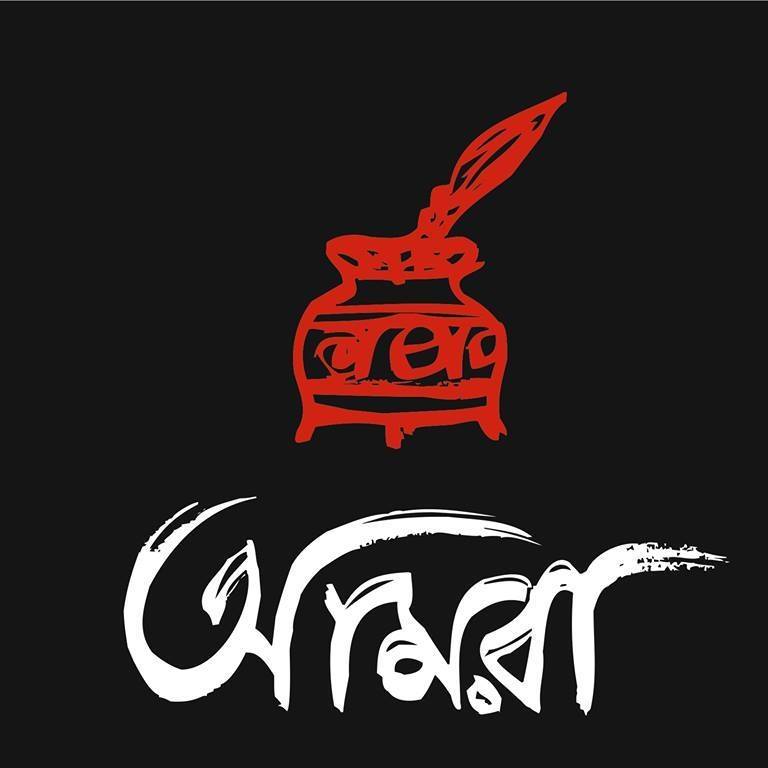
আমরা: এক সচেতন প্রয়াস
AAMRA is an amalgamation of multidisciplinary team of researchers and activists erstwhile worked as an assemblage of movement, research and activism. Popular abbreviation of AAMRA is, An Assemblage of Movement Research and Appraisal.-
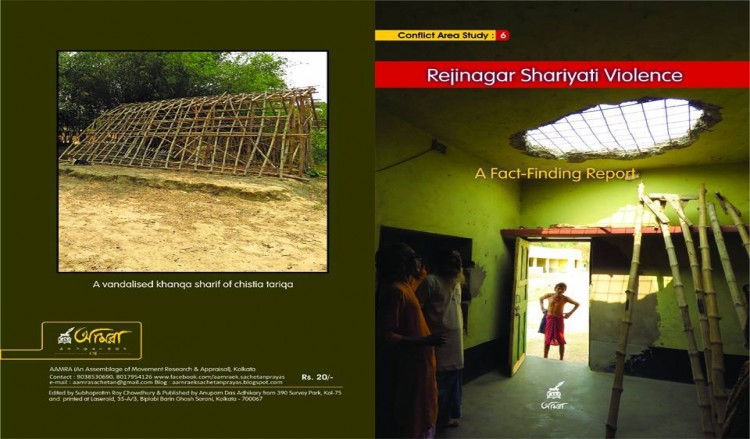
Rejinagar Shariyati Violence
In contemporary Bengal, one of the most important trends... -
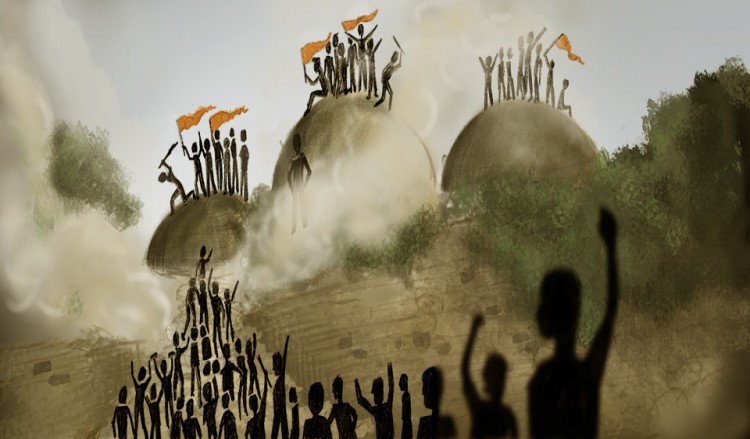
Lord Ram: Where was he born? by Ram Puniyani
Ram Puniyani explores the controversies which are overlooked... -
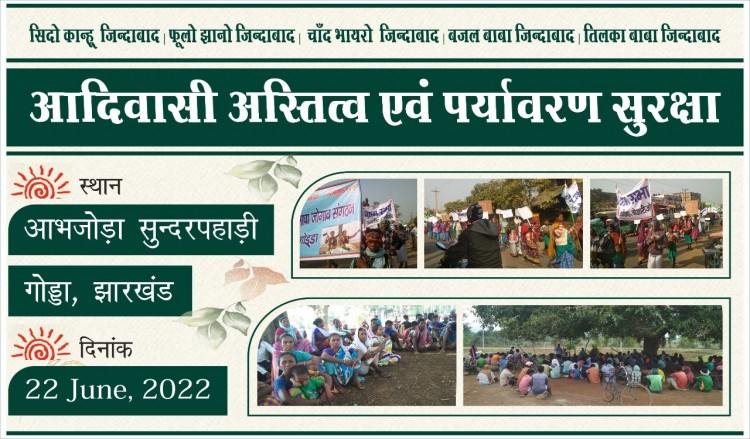
Convention on Tribal Existence and Environmental Protections, Sundarpahari, Godda, Jharkhand, 22 June, 2022
This gathering represented the stirrings of a new Adivasi... -
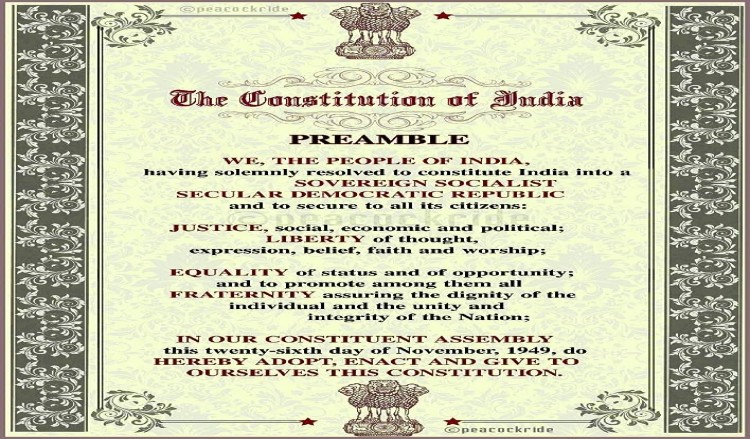
Inauguration of Ram Temple in Ayodhya was against Constitution of India and against ‘Idea of India’
A letter to the Prime Minster of India: Inauguration...
